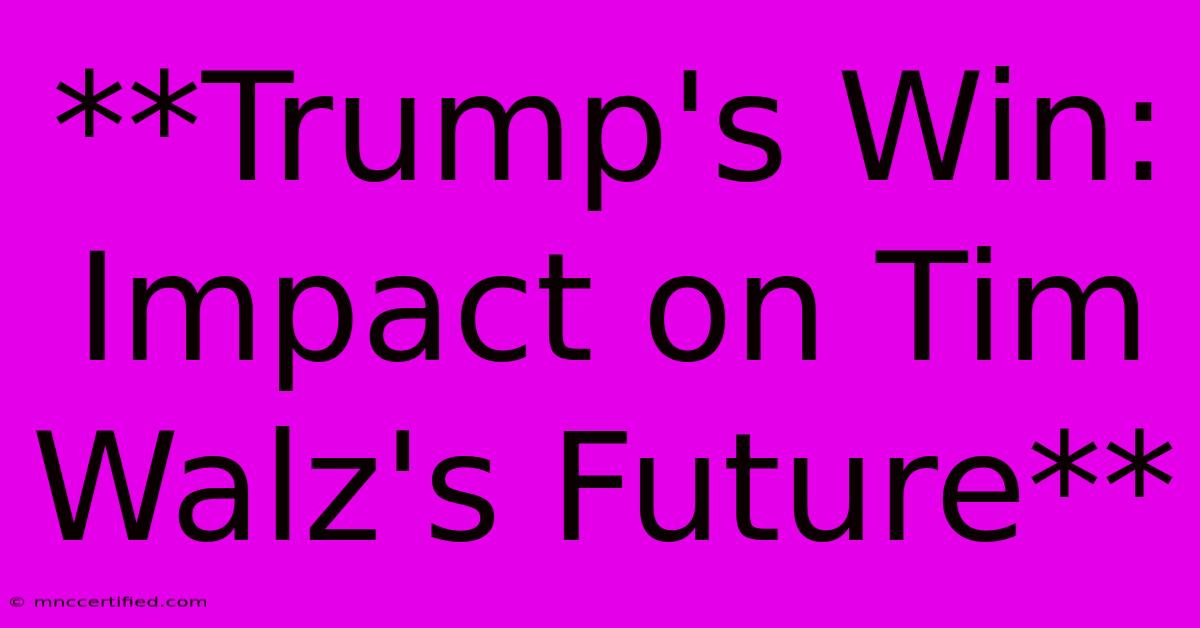**Trump's Win: Impact On Tim Walz's Future**

Table of Contents
Trump's Win: Impact on Tim Walz's Future
The 2020 presidential election saw Donald Trump's defeat, raising questions about the future of Minnesota Governor Tim Walz. While Walz emerged victorious in his own gubernatorial race, the national political climate and the changing dynamics within the Republican party have cast a shadow over his second term.
A Shift in Republican Politics
Trump's loss marked a turning point for the Republican party. While he remains influential within the party's base, his brand of populism and divisive rhetoric have been met with growing unease amongst moderate Republicans. This internal conflict within the party creates a complex landscape for governors like Walz, who navigate the tightrope between bipartisanship and partisan pressure.
Walz's Moderate Approach
Governor Walz has positioned himself as a moderate Democrat, embracing policies that appeal to a broad range of voters. This approach has proven successful in Minnesota, where he secured a comfortable victory in the 2018 gubernatorial election. However, the national political environment has become increasingly polarized, making it difficult for centrist figures like Walz to find common ground with the Republican party.
Potential Challenges for Walz
While Walz's moderate approach has served him well in the past, it may face challenges in the current political climate. The rise of populist movements and the growing divide between Democrats and Republicans could make it harder for Walz to achieve meaningful bipartisan progress. This could lead to political gridlock and hamper his ability to implement his agenda.
The Impact on Minnesota
The national political climate can have a significant impact on state politics. The changing dynamics within the Republican party, coupled with the increased polarization, could affect the level of cooperation between the state government and the federal government. This could impact funding for important state programs and initiatives, potentially hindering Walz's ability to address critical issues facing Minnesota.
Conclusion
The impact of Trump's win on Tim Walz's future is a complex and evolving question. While Walz's moderate approach has proven successful in the past, the changing political landscape may present new challenges. The level of cooperation between the Republican and Democratic parties at both the state and national levels will play a significant role in shaping the future of Minnesota under Governor Walz's leadership. His ability to navigate these challenges and maintain his focus on the needs of Minnesota will be crucial in determining his legacy.
Keywords: Tim Walz, Minnesota Governor, Donald Trump, 2020 Presidential Election, Republican Party, Political Climate, Bipartisanship, Polarization, Moderate Democrat, State Politics, Federal Government, Cooperation, Political Gridlock, Challenges, Legacy.

Thank you for visiting our website wich cover about **Trump's Win: Impact On Tim Walz's Future**. We hope the information provided has been useful to you. Feel free to contact us if you have any questions or need further assistance. See you next time and dont miss to bookmark.
Featured Posts
-
Does Intact Insurance Cover Rodent Damage
Nov 07, 2024
-
Dogecoin Jumps 25 Following Trumps White House Visit
Nov 07, 2024
-
How To Get Iv Fluids Covered By Insurance
Nov 07, 2024
-
United Equitable Insurance Company Reviews
Nov 07, 2024
-
Lineups Announced Bayern Munich Vs Benfica
Nov 07, 2024